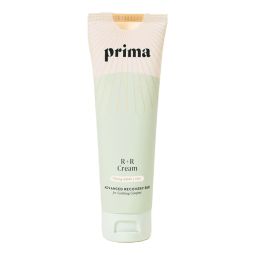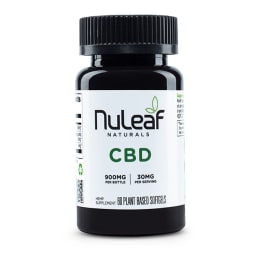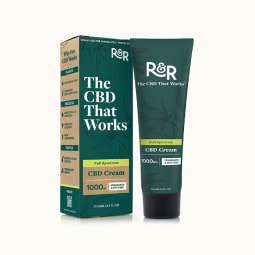Advertisement
How To Use CBD For Nerve Pain & Our Top Picks For Oils, Gummies & Balms


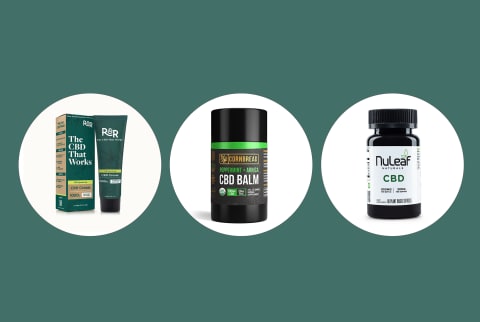
Nerve pain can be a frustrating symptom of disease or injury to the nervous system. It's typically a type of chronic pain that feels like shooting, tingling, or numbness throughout the body. According to the National Institute of Neurological Disorders and Stroke (NINDS), an estimated 20 million people (and likely more) in the U.S. have experienced some form of peripheral neuropathic pain in their lifetime.
Health care providers who treat nerve pain may suggest a wide variety of treatments, ranging from prescription medicines and injections to stretching, physical therapy, and nerve stimulation therapy. But what about CBD?
While studies are limited, preliminary research and anecdotal evidence suggest that hemp CBD may be a helpful tool for nerve pain.* To learn more about CBD's potential role in helping with nerve pain, we consulted a medical cannabis expert.
Does CBD help with nerve pain?
Among its many purported benefits (such as easing mood and promoting sleep) hemp-derived CBD might also be a promising approach for helping manage with nerve pain.* However, while there are some preliminary, animal-based studies to refer to (as well as a great deal of anecdotal evidence1 about CBD's pain-management benefits), research on CBD alone for nerve pain is limited.
Still, board-certified anesthesiologist Jessica Jameson, M.D., FASA—who also developed her own CBD line—tells us that some preclinical research has produced encouraging findings about CBD's mechanisms in helping with nerve pain.
CBD works by interacting with our endocannabinoid system (ECS), a complex system that manages our body's sense of regulation and balance (i.e., homeostasis). Researchers believe that bioactive plant compounds from hemp like CBD help support the body's inflammatory responses and help reduce stress levels in our bodies—this is especially true with full-spectrum hemp CBD products, which include the full array of compounds of the cannabis plant and offer a greater therapeutic effect called the "entourage effect" (more on this in the "how to choose" section).
Of the few studies on CBD for nerve pain to date, there are some hopeful findings:
- This small study from 20202 found that people who used a topical CBD felt relief from nerve-related pain and itchiness.
- A 2019 study in rats3 found that CBD was helpful in reducing pain from nerve injuries and minimizing pain-related anxiety.
- Two case reports from 20204 found significant relief from using a topical CBD cream to treat lower-back neuropathic pain.
Another 2022 review5 suggests that while the body of research around CBD for nerve pain is small and recent, the existing findings should encourage researchers to take a deeper (more clinical) dive into the relationship between phytocannabinoids from hemp and our body's nervous system.
What can't CBD do for nerve pain?
It's important to note that while CBD may help relieve neuropathic pain,* there is currently no evidence to suggest it may reverse or heal nerve damage. It's advantageous to manage your expectations when trying any new treatment but especially CBD, which can affect each person differently.
When it comes to finding the right CBD dose for you, Jameson says, "You should always check with your health care professional before deciding what route and dosage to use, and it is important to start low and go slow."
Types of CBD for nerve pain
Hemp-derived CBD products come in several ingestible and topical forms, such as:
- oil tinctures (ingestible)
- capsules (ingestible)
- gummies (ingestible)
- balms or salves (topical)
- lotions or creams (topical)
"Topical agents act locally on the area to improve symptoms, while ingestible products exert their effect throughout the entire body. Some people prefer to use one or the other or both," says Jameson.
Most of the existing research on CBD for nerve pain uses topical methods of application, such as a balm or cream, as nerve pain is often targeted and felt just under the skin. But oral CBD products can also work to take a broader stab at whole-body health and may be a good fit for people looking to reap additional benefits.*
Whatever you choose, Jameson says that there are three important boxes to tick when shopping for a CBD product: full-spectrum, third-party lab testing and organic farming. We took those criteria to heart when picking the products for this list.
How we picked:
Transparency
Per Jameson's recommendation, we only included brands that are transparent about their ingredients, provide proof of third-party testing certificates of analysis (COAs) to ensure quality and safety, and use organic hemp to ensure you're not exposed to unnecessary toxins.
Brand reputation
We only featured brands that have reputable certifications and outstanding business practices and read the reviews to ensure each product lived up to the hype. Plus, most of the brands on our list have additional sustainability initiatives baked into their business, which we of course love to see.
Price
Quality, organic CBD products can get expensive, especially with higher potencies. We included a range of products with varying price points and potencies to meet every budget.
Variety
Topicals can help target your CBD dose toward a specific area, while ingestibles take a more holistic approach. Whether you're hoping to try a topical cream or chew a gummy, there's a quality product on our list for you.
A few of our favorite CBD products:
Best CBD balm: Cornbread Hemp Full-Spectrum CBD Balm
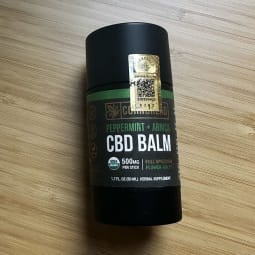
Pros:
- USDA certified organic
- Made from whole-flower hemp
Cons:
- Only one potency option
- Some reviews say it’s greasy
CBD type:
Full-spectrumTotal product potency:
500 mgSize:
2-ounceCost per mg of CBD:
$0.11Subscription discount:
YesOrganic:
USDA certified organicThis whole-flower formula from Kentucky-based brand Cornbread Hemp is USDA certified organic. The balm includes soothing arnica and cooling menthol, which can help relieve surface aches and pains, as well as moisturizing shea butter and coconut oil.
You’ll find 500 mg of full-spectrum hemp CBD in this balm, which Cornbread Hemp says typically breaks down into 60 servings of 8 mg. That’s a more gentle dose, making this pick great for beginners or folks who want to have more control over their dosages.
Reviewers say that the stick form makes this balm easy to apply, especially on hard-to-reach areas, and that it has a pleasant scent. Several positive reviews praise this balm for relieving their aches and pains, including a handful of reviewers with nerve pain issues.* However, a few negative comments mention a greasy feeling left on their skin.
Sustainability & packaging: Cornbread Hemp sources organic hemp from local farms in Kentucky and prides itself on USDA organic certification. The packaging on this balm is a plastic twist stick that should be curbside recyclable (just make sure it’s completely emptied out).
Transparency: The COA for this balm is easy to find via a giant button on the product description page, or you can search for the product via Cornbread Hemp’s lab certificate library.
Pros:
- Strong sustainability efforts
- Non-greasy & great scent
Cons:
- Only one potency option
- No full-spectrum option
CBD type:
Broad-spectrumTotal product potency:
750 mgSize:
3-ounceCost per mg of CBD:
$0.05Subscription discount:
YesOrganic:
PartialWhile most of the picks on our list are full-spectrum, we know that trace amounts of THC may not work for everyone. For a broad-spectrum option, we like this silky smooth R+R cream from Prima. It uses organic, broad-spectrum hemp and natural oils from botanicals like tea tree, eucalyptus, lavender, and rosemary. It has a slight cooling sensation (although it’s nothing like Icy Hot—I’ve tried this cream myself and can attest!) from the peppermint and menthol and a really pleasant light scent. It’s also Leaping Bunny Certified, residue free, and includes hydrating marula oil and shea butter.
Sustainability & packaging: Of the companies on this list, Prima makes the biggest sustainability efforts. A plastic and carbon neutral company, it offsets use of both by removing twice as much plastic waste from the environment as is used across packaging and operations. There’s also a “Recycle for Real” program that encourages customers to send back five empty containers at a time to ensure they’re properly recycled (shipping is on Prima).
Transparency: You can find the COA for this cream on the product page. Prima is also a certified B Corp (which means it’s held to a high standard of social, legal, and environmental transparency), and has an A+ rating from the Better Business Bureau.
Advertisement
Best CBD gummies: Cornbread Hemp Organic CBD Gummies
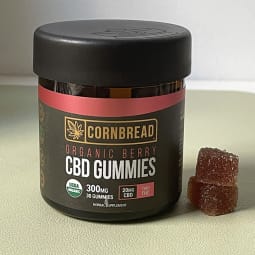
Pros:
- No artificial colorings or high-fructose corn syrup
- 2 strengths & 3 flavor options
- USDA certified organic
Cons:
- No broad-spectrum option
- Have 4g of sugar per gummy
CBD type:
Full-spectrumPotency:
Moderate, 20 mg of CBD per serving; Strong, 50 mg of CBD per servingServings:
15 or 30 per jarCost per mg of CBD:
$0.13Subscription discount:
YesOrganic:
USDA certified organicAnother pick from Cornbread Hemp, these CBD gummies continuously make their way into our “best of” roundups—that’s because they’re vegan, gluten-free, and don’t use any high-fructose corn syrup or artificial colorings. Not only are they USDA certified organic, but the clean formula is available in two potency options: 20 mg (moderate) or 50 mg (strong) CBD per serving.
Not only does our team love the flavor of these gummies, but our vice president of scientific affairs thinks highly of the innovative formula. For those closely watching their sugar intake, just note that each serving (2 gummies)has 4 grams of sugar (after all, they’re gummies!) from organic blue agave and tapioca syrups plus organic cane sugar.
Sustainability & packaging: As we mentioned above, Cornbread Hemp is a Kentucky-based company that sources organic hemp from local farms. Gummies come in a glass bottle with a plastic cap, and all materials should be curbside-recyclable.
Transparency: The COA for Cornbread Hemp’s gummies was easy to find using the third-party lab results database. The brand also shares more about its organic farming and extraction process on the website.
Pros:
- Highly rated
- Flavorless
- Capsules provide convenient, precise dosages
Cons:
- NuLeaf doesn’t have any broad-spectrum options
CBD type:
Full-spectrumPotency:
Moderate, 30 mg of CBD per servingCost per mg of CBD:
$0.05Subscription discount:
YesOrganic:
YesIf tinctures and gummies aren’t for you, these tasteless CBD capsules from NuLeaf Naturals might be more up your alley. They’re made from only organic full-spectrum hemp extract, organic virgin hemp seed oil, cassava root extract, vegetable glycerin, and water.
One of the perks of these capsules is that all three potency options have 15 mg of CBD per softgel (a 30 mg serving requires two capsules). That means you can get pretty specific with each 15 mg capsule to customize your dose.
Sustainability & packaging: NuLeaf Naturals farms organic hemp in Colorado and uses an energy-efficient supercritical CO2 extraction process that’s free of harsh chemical solvents. The company doesn’t offer much information about packaging, but it encourages recycling when you’re finished with your bottle.
Transparency: You’ll find the lab reports for NuLeaf’s full-spectrum CBD on the product page, as well as searching their batch report database.
Advertisement
Pros:
- No added scents or dyes
- 60-day money back guarantee
Cons:
- Only one size option
- Not many product-specific reviews
CBD type:
Full-spectrumTotal product potency:
1,000 mg or 2,000 mgSize:
2.5-ounceCost per mg of CBD:
$0.05Subscription discount:
YesOrganic:
NoIf you prefer the feel of a cream over a balm, you may like this pick from R&R medicinals. It’s an unscented formula that includes either 1,000 mg or 2,000 mg of organic, full-spectrum hemp CBD. The other active ingredients are moisturizing jojoba seed oil, pain-relieving arnica montana, and calendula flower to help encourage inflammatory balance.
While the reviews are tricky to weed through (because the brand doesn’t sort reviews by product), customers give this cream high praise for its smooth application and soothing effects on aches, but also for R&R’s quality customer service. One big pro: If this cream doesn’t work for you, the brand offers a 60-day money back guarantee.
Sustainability & packaging: R&R Medicinals uses USDA certified organic hemp in its products, and an energy-efficient supercritical CO2 extraction process. We weren’t able to find additional details about the brand’s packaging, but it should be curbside recyclable if properly cleaned out.
Transparency: All of R&R’s lab testing results are available on a designated page of the website. The company produces CBD products in an FDA registered facility and is registered with the Colorado Department of Public Health and Environment.
Best CBD oil: Lazarus Naturals Full-Spectrum High-Potency CBD Oil Tincture
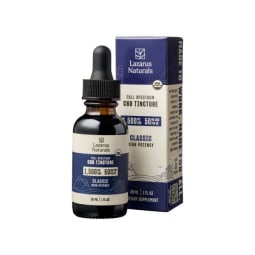
Pros:
- Flavorless & flavored varieties
- Two size options
- Budget-friendly price
Cons:
- Lower-potency option can sell out quickly
- Strawberry lemonade flavor gets mixed reviews
CBD type:
Full-spectrumPotency:
Strong, 50 mg of CBD per servingServings:
30Cost per mg of CBD:
$0.03Subscription discount:
NoOrganic:
USDA certified organicLazarus Naturals prides themselves on offering USDA certified organic CBD products at an accessible price, and this tincture is a great example. With 50 mg of hemp CBD per serving, it’s a stronger pick—but Lazarus offers clear lines on their dropper, so you can easily customize the right dosage for you.
It’s available in three flavor options: unflavored, chocolate mint, and strawberry lemonade (that last one gets mixed reviews). Most reviewers say it does a great job of acting quickly to help their health issues, and a lot of folks mention how affordable this tincture is for the potency. Another noteworthy pro: Lazarus offers 60% off to veterans, people on long-term disability, and households that qualify as low-income.
Sustainability & packaging: Lazarus Naturals farms organic hemp in central Oregon. Another certified B Corp, it uses recycled materials for the packaging and aims to be carbon neutral by 2030.
Transparency: You can access the COA for this tincture on the product page, or via QR code on the product’s packaging.
Advertisement
How to choose
Pick your preferred hemp type:
Per Jameson's recommendations, we focused on full-spectrum hemp CBD products on our list, with the exception of our "best broad-spectrum" pick. As you hunt for your best CBD for nerve pain, it helps to know the difference between the different terms out there:
- Full-spectrum: Full-spectrum products contain CBD and an array of other cannabinoid compounds, including 0.3% or less THC by dry weight (which is within the federal limit), plus terpenes, flavonoids, and more. Researchers6 believe full-spectrum hemp CBD benefits from the "entourage effect," a theory that the combination of compounds makes it a more powerful product.
- Broad-spectrum: While this type contains other compounds like terpenes and flavonoids, it is filtered to contain 0.0% THC. If you're routinely drug tested or simply want to avoid THC, this is probably a better pick for you.
- Isolate: This is the simplest form of CBD. It doesn't have any additional compounds. There aren't any CBD isolate products on this list.
Topical vs. ingestible CBD:
As Jameson noted, whether you choose a topical or ingestible CBD product depends mostly on personal preference. Still, nerve-related pain may benefit from targeted topicals like balms or salves, while more holistic problems might be better off with an ingestible like a gummy, capsule, or oil tincture.*
If you opt for a topical, consider the possible scents or sensations (such as cooling menthol), and if you go for an ingestible, you may want to shop around for a flavor that entices you (but always keep in mind the other ingredients added to the formula).
Ease of application:
If you do go for a topical, consider how easy it'll be to use the product on a regular basis. Some CBD users prefer a balm in a handy twist tube, while others like the feel of a silky lotion. This is another personal preference factor, but it's worth considering if you travel often or have an injury that makes your problem areas hard to reach.
Budget vs potency:
As you'll notice, CBD gets more expensive when the potency is higher. For some folks, a higher-potency option may be worth the price, especially if you're a seasoned CBD user or are opting for a topical that might need a little extra oomph to feel effective.
If you're shopping on a budget, it's something to be aware of, especially for newer CBD users. "If this is your first time taking cannabidiol, then it's probably better to start with a lower dose and slowly increase over time," says Jameson.
FAQ
Do CBD gummies work for nerve pain?
It's still early days for research around hemp CBD and nerve pain, and there aren't any studies to suggest that gummies with CBD-containing hemp extracts in particular are a beneficial approach for nerve pain.
There are some encouraging findings in the general study of CBD, however, which suggest that CBD may help support the body's inflammatory response and help with pain (comfort) levels.* Just know that people respond to CBD differently, and it may take some trial and error to find a dosage that works for you.
Which type of CBD is best for nerve pain?
At this point, the jury's still out on whether there's a best type of CBD product or delivery format for nerve pain. If you're hoping to take a more full-body approach, an ingestible CBD product like a gummy, capsule, or tincture may be for you. If you're hoping to take a more targeted approach to nerve pain, balms and creams are an easy way to apply CBD directly to the areas causing you pain.
What are the side effects of CBD?
Some possible side effects of CBD are sleepiness, fatigue, and appetite changes. You should speak to your doctor before using any type of CBD if you're breastfeeding or pregnant, and avoid CBD if you are allergic to the hemp plant (this is rare).
The takeaway
There's still a lot we don't know about the relationship between CBD and nerve pain. But, while the effects of CBD vary and it may take some trial and error to find the right dose and product for you, there's enough early data to suggest that CBD may be a helpful tool in helping with nerve pain.* CBD is likely not the answer for nerve pain, but it may indeed be a useful piece of the puzzle. If you're suffering from nerve pain and are unsure what to try, be sure to speak with your health care provider.
